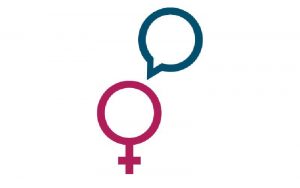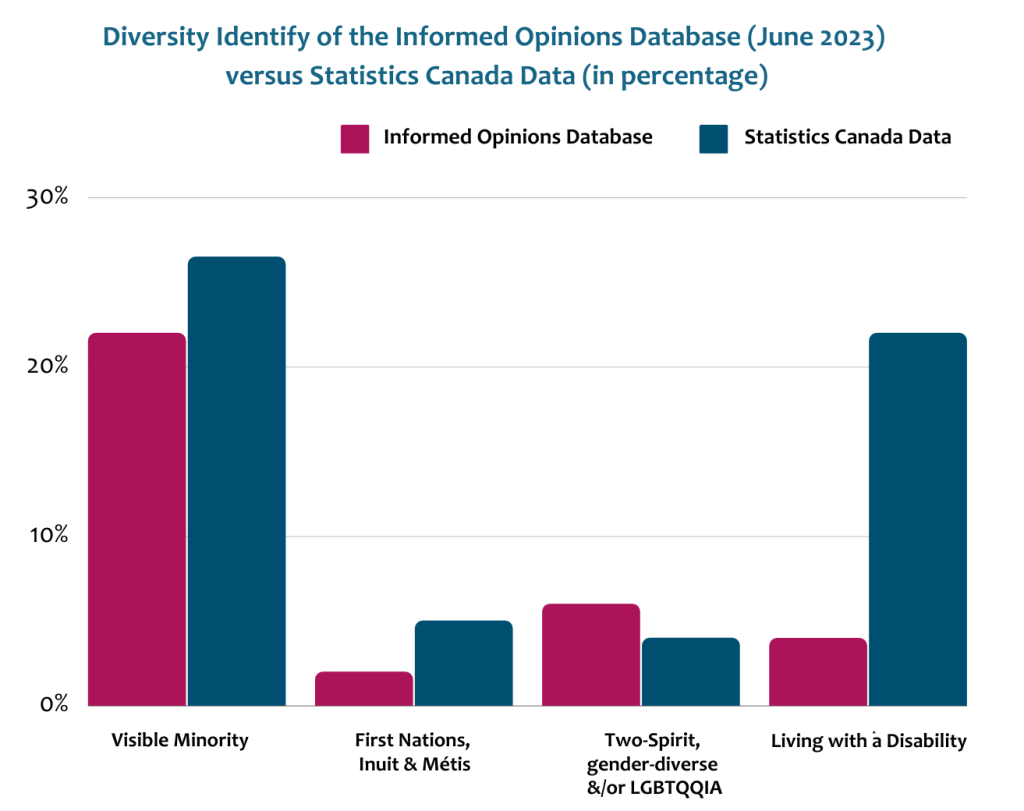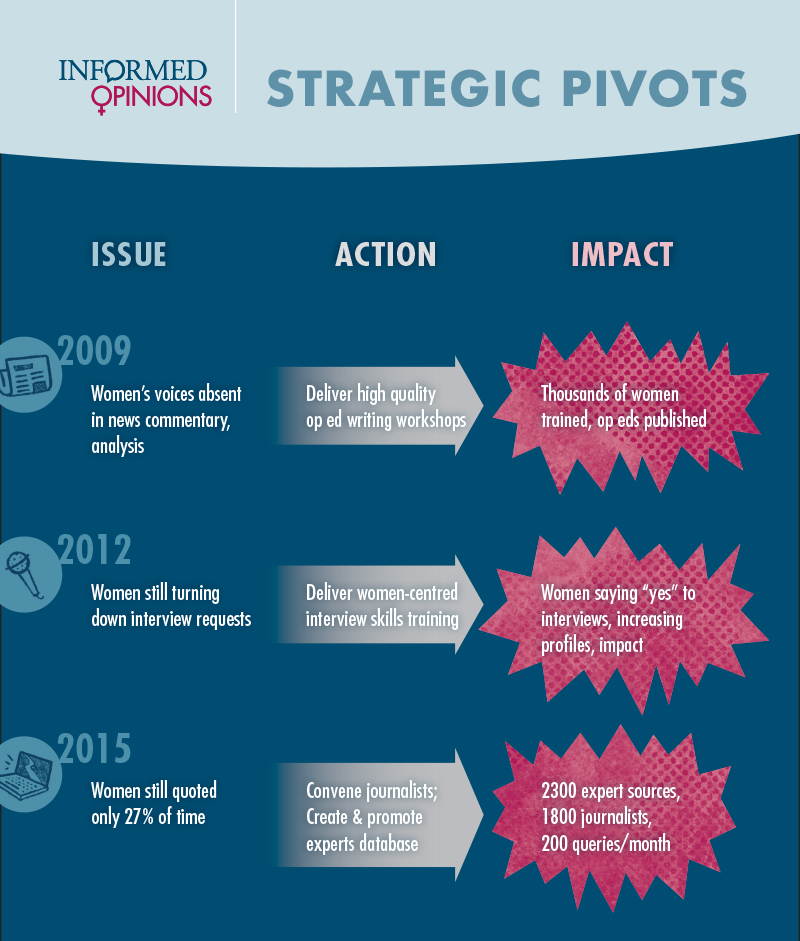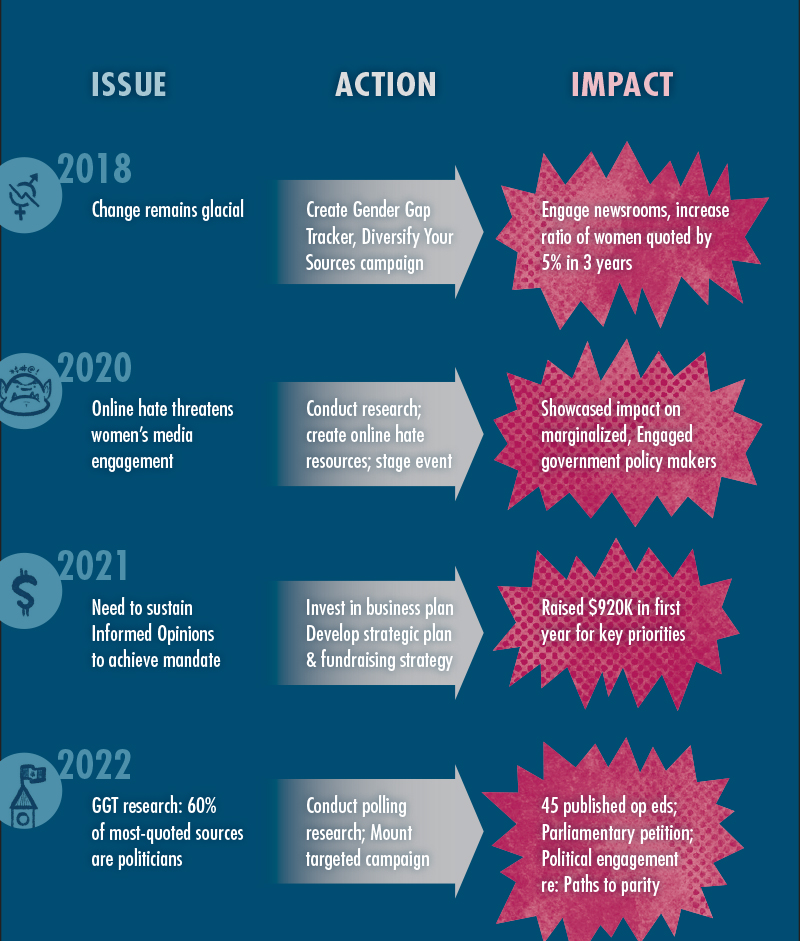 Our Mission
Our Mission
Informed Opinions amplifies the voices of women and gender-diverse people to ensure their experiences, ideas and insights help shape a more equitable, inclusive and democratic Canada.
Our Vision
A Canada where the perspectives and priorities of women and gender-diverse people influence every important decision that gets made.
Our Work and Context
We are a national, non-partisan, charitable feminist organization.
-
We train, nurture and motivate women and gender-diverse people to make their ideas more accessible to a broader audience.
-
We make qualified diverse sources easier for journalists to find so they can more equitably represent the public they serve.
-
We conduct research and share real-time data to track gender source parity progress being made in Canadian media.
-
We advocate the critical importance of these issues with those with the power to make change, both in the news media and in the political sphere, because they have the capacity to influence everything else.
-
We partner with academia, non-profits, business and governments to scale our impact and to support their gender equity objectives.
-
We provide services virtually and in person to individuals and organizations across Canada in English and French, and in Quebec through our sister organization, Femmes Expertes.
-
As a mission-driven charity, all of Informed Opinions’ service offerings support our aims and are developed and priced to be accessible to as many women and gender-diverse participants as possible. All revenue goes back into advancing gender equity in Canada.
The news media set agendas, shape policies and impact spending. The voices they amplify wield outsize influence. And yet research finds that women’s voices make up less than a third of those being heard through Canada’s most influential news sources. That reflects a mere 7% shift in the past quarter century. Indigenous and racialized women, women living with a disability, those who identify as Two-Spirit, gender diverse, and/or LGBTQQIA, women of diverse faiths, women experiencing incarceration, women who live in rural, remote, and northern areas, working-class women, women experiencing poverty, women who are street associated — their vital insights are often further marginalized.
The absence of diverse women’s experience-informed insights undermines democracy, denies Canada access to the analysis and ideas of many of its informed and perceptive voices, and reduces our capacity to effectively address the social, economic and environmental challenges we face.
You can help. Join our database of sources, sign up for the journalists’ mailing list, or donate.
Our Land Acknowledgement and Promise to Reconciliation
Informed Opinions, as a national, virtual organization, acknowledges that the land on which we live and work is the homeland of First Nations, Inuit and Métis peoples, who have lived on it for millennia. We also recognize the genocidal policies implemented against Indigenous peoples by settlers and many elected governments acting on citizens’ behalf. We profoundly regret that historical and contemporary policies continue to disenfranchise Indigenous communities. We commit to ongoing education and reconciliation, and to implementing measures in the context of our work that will help address the intergenerational trauma still playing out in this country.
Our Commitment to Anti-Racism and Inclusion
 Informed Opinions’ work is predicated on the following principles:
Informed Opinions’ work is predicated on the following principles:
- Responsible journalism is essential to the functioning of a democratic society;
- Diverse sources are a hallmark of responsible journalism;
- The news media’s current over-reliance on white male sources is neither democratically responsible nor good journalism, and robs our public discourse of critical insights.
We recognize that racism, like sexism, is systemic and can be unconscious; people who hold concerning attitudes or manifest discriminatory behaviour don’t always intend negative impact. As an organization, we understand that combating systemic racism and unconscious biases requires us to be proactive. We invite and will respect feedback on how we may support this ongoing objective in all aspects of how we operate. We pledge to address identified sensitivities and inequities, and areas where we can improve tools and support.
In advocating for the promotion of more women’s voices in Canadian news media, we are also deliberate about seeking to amplify the perspectives of Black, First Nations, Inuit and Métis, and people of colour, those who identify as Two-Spirit, gender diverse, and/or LGBTQQIA, and those who are living with disabilities. We recognize that there are many intersectional realities that are even less represented within the already limited expression of women’s perspectives across all fields and sectors.
As part of our anti-racism, equity and inclusion strategies, we track the ratio of diverse voices featured in our database, and are working to ensure that we reflect and improve upon levels of representation that correspond to Canada’s population. To do this, we’re comparing our data (which itself depends on experts’ willingness to self-identify) to that gathered by Statistics Canada’s 2021 census and Statistics Canada’s New Data on Disability 2017. Although we understand the limitations of the categories and terminology, this research gives us a verifiable basis of comparison against which to measure our progress.
Our History
Media Action (previously MediaWatch) is a national, non-profit charitable organization that has been using research and education to advocate for the improved portrayal and representation of women and girls in the media since 1980.
In 2010, former longtime president Shari Graydon created Informed Opinions as a project of Media Action with the aim of bridging the gender gap in Canadian public discourse. Since 2010, Informed Opinions has helped amplify the voices of more than 4,500 women across Canada, supporting them in sharing their insights and analysis with a broader public.
In September 2019, Media Action was changed to the legal name Informed Opinions.
We are relentlessly focused on impact, seeking to understand and then overcome barriers that prevent women’s voices from exerting as much influence, in every important arena, as their male colleagues. These are the strategic pivots we’ve taken since 2009:


